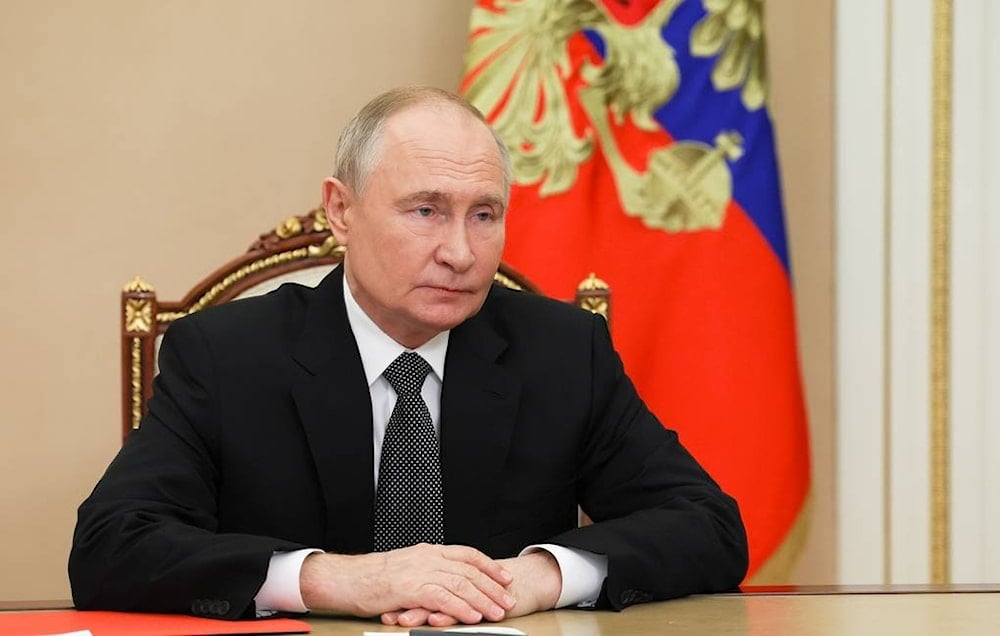Putin approves Russia's updated framework on nuclear deterrence
The decree, which takes effect on November 19, emphasizes enhancing Russia's nuclear deterrence strategy to address potential threats and maintain national security.
-

Russian President Vladimir Putin (TASS)
Russian President Vladimir Putin has approved the framework for Russia's state policy on nuclear deterrence, as outlined in a decree published on the legal information portal on Tuesday.
The timing of the issuance of the decree is critical as it comes mere days after US President Joe Biden approved Ukraine's use of American long-range missiles against military targets within Russia, in a significant policy shift long sought by Kiev.
Putin has warned that such a decision would signify NATO's direct involvement in the conflict.
The decree, which takes effect on November 19, emphasizes enhancing Russia's nuclear deterrence strategy to address potential threats and maintain national security.
It categorizes aggression against Russia or its allies by a non-nuclear state supported by a nuclear one as a joint attack, adding that any aggression from a state within a military coalition is treated as an act of aggression by the entire coalition.
According to the document, deterring aggression is identified as one of Russia’s highest state priorities, supported by the nation’s overall military capabilities, including nuclear forces.
Russia’s nuclear deterrence policy is described as defensive, aimed at maintaining its nuclear forces at a level sufficient to ensure deterrence, protect sovereignty and territorial integrity, and prevent the escalation of military conflicts.
The policy highlights the inevitability of retaliation in the event of aggression against Russia or its allies and is adaptable to evolving military dangers and threats.
The decree points out that the scope of nuclear deterrence encompasses states, blocs, or alliances that consider Russia an adversary, possess weapons of mass destruction, or provide resources for aggression against Russia.
Conditions that could prompt the use of nuclear weapons include reliable information on the launch of intercontinental ballistic missiles targeting Russia or its allies, actions to isolate parts of Russian territory, or attacks on ecologically sensitive facilities leading to catastrophic consequences, the document indicated.
Other conditions for Russia's potential use of nuclear weapons include confirmed launches of air and space-based attack systems, incursions into Russian borders, and the use of weapons of mass destruction against Russia or its military forces.
According to the decree, Russia’s nuclear deterrence forces consist of land-based, sea-based, and air-based components capable of inflicting unacceptable damage on potential adversaries.
The policy also identifies the deployment of nuclear weapons in non-nuclear states and the presence of advanced military technologies such as hypersonic weapons and attack drones as the main military danger for Russia.
The document underlines Russia’s efforts to reduce nuclear risks and prevent escalations that could lead to military conflicts, including nuclear ones.
It also reiterates the country's right to use nuclear weapons as an extreme measure in response to the use of weapons of mass destruction or conventional aggression against it or against its allies.
Moreover, the decree notes that the principles underpinning Russia's state policy on nuclear deterrence may be adjusted in response to external and internal factors.
It emphasizes that Russia views nuclear weapons as a deterrent, emphasizing that their use would be an extreme and last-resort measure.
Elsewhere, the document underscores that the decision to deploy nuclear weapons is made by the Russian President, who, if necessary, may notify other nations of such readiness.
This comes after US President Joe Biden approved for the first time Ukraine's request to use US long-range missiles for strikes on Russian territory, signaling a dramatic shift in US policy, The New York Times reported.
The Biden administration was afraid that Kiev's potential strikes with long-range missiles could prompt Russia to launch a military reaction against the US and its allies, the article stated on Sunday.
The decision to provide Ukraine with long-range ATACMS missiles has been a contentious issue since the war in Ukraine began, with some Pentagon officials concerned about limited US supplies, while White House officials feared escalating the war by supplying the missiles.
Read more: Russia ratifies strategic partnership, pledges mutual defense

 4 Min Read
4 Min Read









